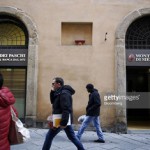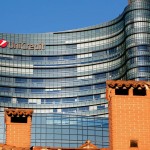Italians Join Greeks Selling Bank Stock to Once-Wary Investors

Eight Italian banks are preparing to sell at least 8 billion euros ($11 billion) of stock to shore up their balance sheets, as nations shunned during the sovereign-debt crisis return to favor with investors.
Leading the pack is Banca Monte dei Paschi di Siena SpA, the world’s oldest bank and Italy’s third largest by assets, which plans to seek 3 billion euros as early as May. Two of the biggest banks in Greece, which needed an international bailout, tapped stock investors for 2.95 billion euros this week.
Italy is riding a swell of investor confidence as it emerges from the deepest recession since World War II. The rise to power of a new prime minister who has pledged tax cuts and a labor market overhaul has also improved the mood. The FTSE Italian All-Share Banks index increased 25 percent this year, compared with a 0.8 percent gain in the Bloomberg Europe Banks and Financial Services Index.
“I expect a huge appetite for the upcoming rights offers,” said Emanuele Vizzini, who manages $2.5 billion as chief investment officer at Investitori Sgr in Milan. “Even after the recent rally of Italian banks, shares are still cheaper than in other peripheral countries.”
Vizzini said the stock offerings may attract buyers who pulled out of emerging markets in recent months to seek higher returns in developed nations.
Italian banks may have more room to rise than peers in Europe, based on the ratio of their share prices to tangible book value, or the net worth of their tangible assets. Italian banks trade at an average of 0.86 times that measure, compared with 1.34 times for Spanish lenders and 1.27 times for the 43-company Europe banks index, data compiled by Bloomberg show.
ECB Review
The improvement in investor sentiment comes as the European Central Bank conducts a review of lenders’ assets before becoming the euro area’s banking supervisor later this year. The results are due in October, and banks that don’t pass muster may have to raise extra capital.
Some are already doing so. Piraeus Bank SA, Greece’s second-largest lender, raised 1.75 billion euros selling stock, it said yesterday, while Athens-based Alpha Bank AE is raising 1.2 billion euros. Spain last month sold 7.5 percent of Bankia SA, the bailed out Madrid-based bank, for 1.3 billion euros.
Monte Paschi will start its sale after May 12, CEO Fabrizio Viola has said, while Banca Popolare di Milano Scarl expects to begin its offer May 5. Banco Popolare SC will start its 1.5 billion-euro stock sale at the end of this month, CEO Pierfrancesco Saviotti said March 1.
Banca Popolare di Vicenza is looking to raise 1 billion euros through stock sales in the next few months. Offerings have also been approved by Banca Carige SpA, Banca Popolare di Sondrio Scrl, Credito Valtellinese Scarl and Veneto Banca SCPA.
Economic Growth
Monte Paschi said earlier this month it renewed an agreement with banks, including UBS AG and Mediobanca SpA, to arrange its sale under the same terms agreed to in December.
The bank’s biggest investor, Fondazione Monte dei Paschi, blocked a stock offering planned for January because it couldn’t find a buyer for its stake. Monte Paschi, the Siena-based bank, needs to raise the funds to help repay a government bailout and avert partial nationalization.
Italy’s economy grew 0.1 percent in the fourth quarter, the first expansion in more than two years. The European Commission in February forecast 0.6 percent growth in Italy’s gross domestic product this year.
Italian bonds rallied with those of the region’s other peripheral nations this year on optimism the euro-area economy is emerging from the sovereign-debt debacle. Italy’s 10-year debt yield has fallen 79 basis points, or 0.79 percentage point, in 2014.
Ambitious Agenda
Matteo Renzi, Italy’s 39-year-old prime minister, has promised to simplify the justice system and public administration, modify the tax code, and overhaul the labor market within the year. He also plans to repay debts the state owes to businesses.
While Renzi’s plans are boosting confidence, the country still faces record unemployment of 12.9 percent. Firms and families struggle to repay debts, forcing banks to set aside more money for soured loans.
Non-performing loans at face value as a proportion of lending increased to 8.4 percent in January from 6.4 percent a year earlier, according to data from Italy’s banking association. That’s the highest since April 1999 and up from 3 percent in June 2008.
“We do not share investors’ optimism about Italian banks’ medium-term profitability potential,” said Andrea Vercellone, an analyst at Exane BNP Paribas.
‘Spring Cleaning’
Investors have looked beyond weak earnings and bet on the future benefits of restructuring. Shares of UniCredit SpA, Italy’s biggest bank, rose 6.2 percent on March 11 even as it posted a record loss of 15 billion euros.
UniCredit, Banco Popolare and Monte Paschi all increased provisions in the fourth quarter to cover bad loans.
“Investors like banks’ spring cleaning and consider recent booked losses a break with traditional opaque accounting,” said Karim Bertoni, an analyst at de Pury Pictet Turrettini & Cie. in Geneva. “Foreign players are betting on the cheapest made-in-Italy banks.”
BlackRock Inc., the world’s largest money manager, increased its stake in UniCredit through the funds it oversees to 5.2 percent this month, becoming the Italian lender’s biggest investor. New York-based BlackRock also boosted its holding in Monte Paschi to 5.75 percent, making it the No. 2 shareholder.
Fondazione Monte dei Paschi sold a 12 percent stake in Monte Paschi on the market in a few hours on March 18, almost half its holding. The foundation’s chairman, Antonella Mansi, said in an interview the following day she is in talks with foreign investors to sell more shares.
Source: bloomberg





























